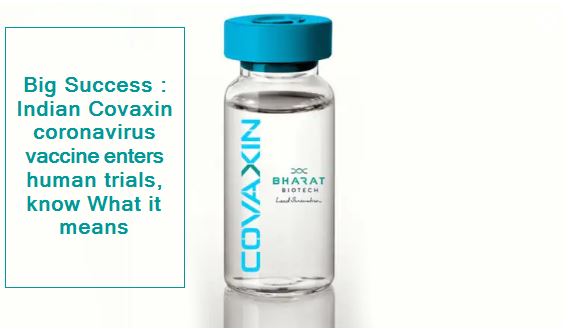Big Success : Indian Covaxin coronavirus vaccine enters human trials, know What it means
India’s first experimental novel coronavirus vaccine — Covaxin developed by Bharat Biotech — is beginning human trials at AIIMS, New Delhi this week. We break down how the Covaxin was developed, what will happen in the vaccine’s human trials, and how long it might take for this to be completed
Indian coronavirus vaccine for human trial
ovaxin, an experimental novel coronavirus vaccine developed by Hyderabad-based Bharat Biotech, is beginning human trials at New Dehi’s All India Institute of Medical Sciences this week. AIIMS-New Delhi is one the 12 sites chosen by the Indian Council of Medical Research, which is a collaborator on the Covaxin novel coronavirus vaccine project, for conducting human trials of the Covid-19 vaccine candidate.
AIIMS-New Delhi will begin by screening volunteers to take part in phase I human trials of the Covaxin Covid-19 vaccine. Those selected to take part in the trial will be administered a dose of the experimental vaccine later this week. Similar processes will be undertaken at the other pan-India sites that have been chosen to test the Covaxin vaccine.
Read on, as we break down what’s happened so far and what will happen in upcoming days and weeks as human trials begin for this novel coronavirus vaccine candidate. (The following information has been sourced from Bharat Biotech and the Covaxin’s human trials registration document.)
What is Covaxin?
Covaxin is a novel coronavirus vaccine candidate developed by the Hyderabad-based biotech firm Bharat Biotech in collaboration with the Indian Council of Medical Research. Covaxin is an ‘inactivated vaccine,’ i.e. it is made up of novel coronavirus particles that have been treated in a laboratory and made to lose their ability to cause an infection.
The idea is that once the vaccine is in your system, your immune system will learn how to recognise and fight the novel coronavirus without your body being at risk of an actual infection. This is a traditional approach to vaccination.ADVERTISEMENT
What has happened with Covaxin so far?
Work on Covaxin began in May this year when the ICMR isolated a strain of the novel coronavirus and transferred it to Bharat Biotech. Bharat Biotech then started work on ‘weakening’ or ‘inactivating’ the strain for a potential vaccine. The work was carried out at a BSL-3 (Bio-Safety Level 3) facility in Genome Valley, Hyderabad.
Late June, Bharat Biotech announced it had completed pre-clinical studies, i.e. studies in a laboratory and on animals, and managed to demonstrate “safety and immune response”. Following this, Bharat Biotech was given the go-ahead by the government to test Covaxin on human volunteers.
When will Covaxin’s human trials begin?
Technically, they have already begun. This weekend, AIIMS-New Delhi’s Ethics Committee gave the go-ahead for the hospital to begin human trials of Covaxin. (An Ethics Committee, which is based out of a hospital, is responsible for on-ground oversight of individual human trials.)
Following this, AIIMS-New Delhi began screening participants for the human trials. The Covaxin trial at AIIMS-New Delhi aims to start dosing participants later this week. Similar processes will take place at 11 other hospitals across the country once their respective Ethics Committees give their go-aheads.
[amazon box=”B07H97FRX5″ “small”]
What will happen in Covaxin’s human trials?
Bharat Biotech has received government approval for both phase I as well as phase II human trials. Currently, phase I human trials are getting underway.
- In phase I trials, researchers will primarily aim to check whether the vaccine is safe enough to be tested on a larger set of people. A secondary goal will be to see whether the vaccine produces any level of immune response.
- Once the vaccine moves to phase II trials, researchers will turn their focus to testing for Covaxin’s ability to induce necessary immune response against the novel coronavirus.
- In phase III trials, the timeline for which has not been announced yet, researchers will aim to test every aspect of the vaccine, including safety and the ability to induce immunity. The vaccine will be ready for real-world use if it clear phase III trials.
How many people will take part in Covaxin’s trials?
Covaxin’s phase I trials will see participation from 350 people across the country. Of these, the maximum — 100 volunteers — will be taking part in the trial being held at AIIMS-Delhi, news agency PTI reported on June 18. The phase II trials for Covaxin, on the other hand, will have 750 people participating across the country.
In both the phases, participants will be divided into four groups. Three of these will receive either one of three Covaxin formulations. The last group — a ‘control’ group — will receive a Japanese encephalitis vaccine that was previously developed and successfully tested by Bharat Biotech.
The control group is meant to help researchers compare and better understand the effects Covaxin once it is in the human body. No participant will know whether he/she is receiving the experimental vaccine or the ‘comparator’ agent.
How long will Covaxin’s human trials take?
It is tough to say, really. Scientists across the world are racing to develop a safe vaccine for the novel coronavirus. The current record for the fastest developed vaccine stands at four years for the mumps shot.
In Covaxin’s case, Bharat Biotech, in its trial registration, has said the combined phase I/II trials are estimated to take one year and three months to complete. On July 20, AIIMS chief Dr Randeep Guleria told media that the phase I human trials will take around two to three months to complete.




